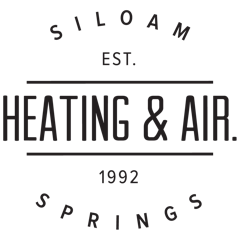
If you’re unsure whether your Siloam Springs house has bad indoor air quality (IAQ), it possibly does.
We are indoors a lot. In reality, we’re indoors up to 90% of the time, according to the U.S. Environmental Protection Agency. And the air inside homes could be 2–5 times worse than outdoors, which may create long-term health concerns.
Most Common Sources of Unsatisfactory IAQ
We’ve made a list of the most common sources of bad IAQ, the problems they make and how you can remedy these indoor air pollutants. If you’re worried about the air inside your home, we suggest talking with a pro like Siloam Springs Heating & AC about which options are ideal for your house.
Volatile Organic Compounds
Volatile organic compounds, or VOCs, are chemicals released by common household items.
They’re found in paint and stains along with:
- Furniture
- Carpet
- Building materials
- Cleaning products
- Cosmetics
- Air fresheners
- Candles
When these chemicals accumulate in your home, they may irritate your eyes, nose and throat. They may also cause headaches and nausea. Regardless of whether your house is in a rural or industrial space, an EPA study found indoor levels of these fumes can be 2–5 times higher than the air outdoors.
Always follow the manufacturer’s instructions when painting or cleaning. Cracking a window can help odors disappear faster.
Air purification systems can also better your air. This system partners with your heating and cooling equipment to enhance indoor air. When seeking one, ensure it’s specifically designed to eradicate VOCs.
Dust and Pet Dander
Dust and pet dander can irritate health problems like asthma and allergies, especially when it continuously gets redistributed by your house’s comfort unit. While you can vacuum more regularly and get an improved air filter, an air filtration system could be a better match.
This solution hooks to your heating and cooling equipment to deliver powerful filtration. Some types have hospital-level filtration for removing particles and bioaerosols.
Lingering Odors
New residences are securely sealed to boost energy efficiency. While this is good for your energy bill, it’s not very good for your IAQ.
Stale odors can stay around for a greater amount of time because your house is pulling in reduced fresh air. As keeping your windows open all year-round isn’t a possibility, here are two ways you can make your indoor air smell cleaner.
An air purification system is installed in your HVAC system to eliminate odors before they get released again. Search for one with a carbon filter and the capability to wipe out damaging VOCs. These systems can also help keep your loved ones healthy by eliminating most bacteria and normal allergy triggers like pollen and mold spores.
A ventilation system takes out musty indoor air and exchanges it with clean outdoor air. There are two types of equipment (heat recovery and energy recovery), so check with our professionals for more information on which type is right for your house.
Unsteady Humidity
It’s important your residence’s humidity stays even. Air that has too much moisture can lead to mold, while dry air can lead to respiratory concerns.
Our pros suggest 40–50% for top comfort. To keep yours even, think over getting a whole-home humidifier or whole-home dehumidifier with your heating and cooling equipment.
Instead of having to lug a humidifier from room to room, this product delivers consistent humidity throughout your house.
Carbon Monoxide
Carbon monoxide is colorless gas you can’t smell. It’s caused by insufficient combustion in fuel-burning equipment, like gas heating systems, water heaters or fireplaces.
It poses an extreme health risk. In small levels, it can lead to flu-like ailments like headaches and nausea. It can be fatal in heavy concentrations.
We recommend annual furnace maintenance to make sure your system is working like it should. This service allows our techs to find troubles before they begin, including malfunctions that can lead to carbon monoxide leaks.
The best approach to keep your house free of carbon monoxide is to get detectors. These alarms need to be on every floor close to bedrooms and living rooms.
Improve Your Home’s Air Quality with the Siloam Springs Heating & AC Pros
Aware that your residence has inferior air quality but not sure how to make it better? Or unsure which solution is best for you? Give our kind HVAC pros a call at 479-448-2261 or contact us online now. With free estimates and professional support, we’ll help you choose the best equipment for your family and budget.


